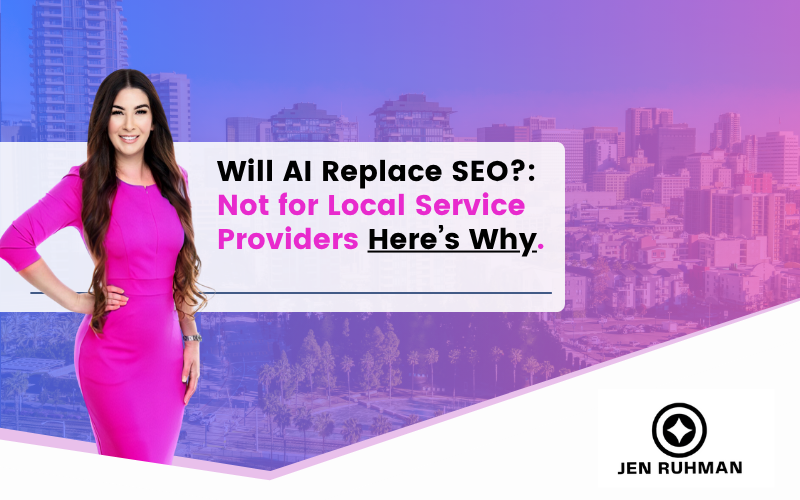
May 29, 2025 | SEO Tips

Hi, I’m Jen Ruhman, and I run an SEO company in San Diego. I’ve been helping local businesses get found online for years—way before ChatGPT made its debut. And now that AI is everywhere, I keep hearing the same question:
“Jen, is AI going to replace SEO?”
Let me be real with you—absolutely not. Especially not for local service providers here in San Diego. Let’s dive into why you don’t need to panic and how SEO still plays a massive role in growing your business.
What’s All the Hype About AI and SEO?
AI Is a Tool—Not a Replacement
There’s no doubt AI is changing the game. From content creation to search engines integrating AI-generated answers, it can feel like SEO is getting left behind.
But here’s the truth: AI isn’t replacing SEO. It’s just evolving it.
Think of AI like a power tool—it can help you work faster, but you still need the know-how to use it effectively.
Why Local Businesses in San Diego Don’t Need to Worry
1. Local SEO Is Built on Trust and Location
AI might be smart, but it doesn’t know your community like you do. When someone searches for a “plumber in North Park” or a “wedding photographer in La Jolla,” they’re looking for local, real-life expertise. Google’s local pack results still rely heavily on:
AI can’t replicate your trust factor in the community.
2. Google Still Relies on SEO Signals
Even with AI advancements, Google still looks at traditional SEO factors like:
If anything, AI makes competition tighter, so you need stronger SEO, not less of it.
3. Service Businesses Thrive on Local Search
Let me give you an example. I helped a mobile dog groomer in Pacific Beach go from being invisible online to getting fully booked weeks out—just by optimizing their Google Business Profile, adding localized blog posts, and cleaning up their on-page SEO.
No AI tool would’ve known how to position that business like we did. That kind of personal, localized strategy only comes from a real SEO expert who understands San Diego.
How I Use AI to Boost SEO—Not Replace It
1. Smarter Keyword Research
Yes, I use AI to brainstorm long-tail keywords and content ideas—but then I dig deeper using tools like Ahrefs and Google Search Console to see what’s actually driving clicks in San Diego.
2. Faster Content Drafting (But I Always Edit!)
AI can help draft outlines or generate content ideas, but the final version is always human-polished. I add local flavor, clear calls to action, and SEO best practices that AI often overlooks.
3. Supporting My Clients with Real Strategy
SEO is more than just writing articles. I create full strategies—technical audits, schema markup, backlink outreach, and even local landing pages designed to convert. AI can’t do that with your goals in mind.
What AI Can’t Replace in Local SEO
Your Reputation
Google still wants to show real businesses with real reviews. AI can’t fake your years of hard work or the five-star service you give to your customers.
Community Presence
When I optimize your content, I mention real San Diego neighborhoods, landmarks, and events. That kind of relevance tells Google you’re truly local, not just another business on the internet.
Strategic Thinking
SEO isn’t a checklist. It’s a moving target, and it takes strategy. You need to know when to focus on backlinks, when to update content, and how to outpace your competitors. AI might offer suggestions, but it’s not strategic.
Bottom Line: SEO Isn’t Going Anywhere in San Diego
I get it—AI is exciting. But for local service providers, especially here in San Diego, SEO is still your best friend. It’s how customers find you when they’re ready to book, call, or visit.
Local SEO is about showing up at the right time in the right place with the right message.
And that’s something AI just can’t replicate.
Let’s Work Together
If you’re a San Diego business owner and you want to stand out online, let’s talk. I’ll help you:
Call or text me directly at (619) 719-1315
Or visit my website: JenRuhman.com
FAQs
1. Can AI write SEO content for my San Diego business?
It can help start the process, but it won’t create the personal, localized content that connects with your audience and ranks well.
2. Will AI-generated answers replace Google search results?
AI results may show up more often, but Google still values optimized websites, especially for local intent.
3. What if I already use AI tools for marketing—do I still need SEO?
Yes! AI tools are helpful, but they need a smart SEO strategy to guide them.
4. How is local SEO different from regular SEO?
Local SEO focuses on specific locations, like neighborhoods in San Diego. It includes map listings, local keywords, reviews, and community engagement.
5. How long does it take to see results from local SEO?
You can start seeing results in as little as 3-6 months with the right strategy and consistent work.
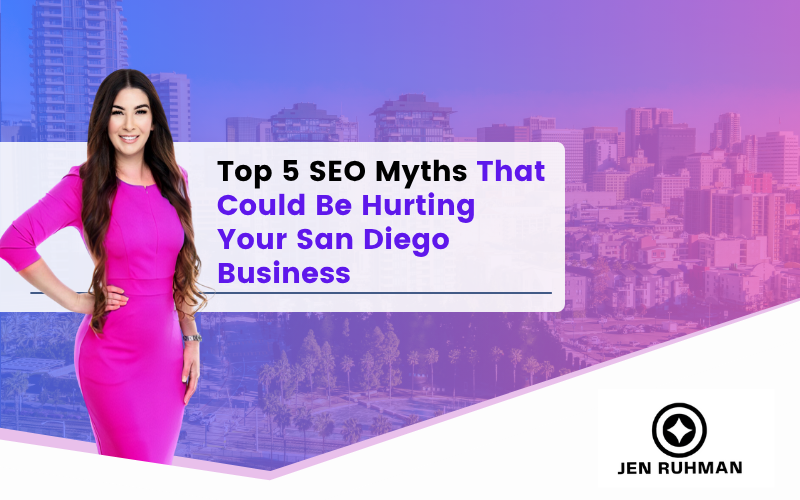
May 18, 2025 | SEO Tips
Hey there, San Diego business owners! I’m Jen Ruhman, owner of your favorite SEO company in San Diego -jenruhman.com, and as someone who spends every day helping businesses rank better on Google, I know a thing or two about SEO. But let me tell you—there are a ton of myths floating around that could actually be hurting your online visibility. If you’ve been scratching your head wondering why your website isn’t ranking higher, it might be because you’re believing one of these common myths.

Let’s clear things up, shall we?
Myth #1: SEO Is a “Set-It-and-Forget-It” Task
Here’s something I often hear from my clients: “Jen, we optimized the website two years ago—aren’t we good to go?” Unfortunately, SEO isn’t like a crockpot dinner; you can’t just set it and walk away. The internet changes fast, Google updates its algorithm regularly, and your competitors never sleep.
Why Constant SEO Updates Matter
Your website needs consistent attention and updates. Think of SEO like tending a garden—regular watering and pruning help your website grow stronger over time. If you neglect it, weeds (your competitors) will take over your space. Regular content updates, technical checks, and keyword adjustments are essential for long-term growth.
Myth #2: Keywords Are All That Matters
Another common misconception I run into is that stuffing your content with keywords will shoot you straight to the top. I get it—keywords are super important. But guess what? They’re not everything.
Quality Content Is King
Google’s algorithms have evolved to understand context and user intent, not just keywords. So, when you’re creating content, write naturally and think about what your audience truly wants to know. For example, I had a client here in San Diego—a local restaurant—that focused heavily on keyword stuffing instead of genuine content. Once we shifted to writing engaging, helpful articles about their cuisine and local attractions, their organic traffic soared!
Myth #3: Social Media Has No Impact on SEO
Some businesses believe that social media and SEO are completely separate. But here’s the truth—your social media presence indirectly influences your SEO.
How Social Media Supports SEO
When you share your content on platforms like Facebook, Instagram, LinkedIn, or Pinterest, it helps drive traffic to your website. More traffic signals to Google that your website is valuable and relevant. Additionally, when your content is shared widely, it earns backlinks, further boosting your site’s authority.
One of my favorite examples is a San Diego clothing boutique I helped. After starting to actively promote their blog content through Instagram and Pinterest, their organic traffic increased significantly—and their rankings improved along with it.
Myth #4: Paid Ads Improve Organic Rankings
This myth is widespread. Many business owners believe if they spend money on Google Ads, their organic rankings will also improve automatically. The truth is, paid ads and organic rankings operate independently.
Organic and Paid: Two Different Worlds
Google clearly separates paid search results from organic ones. Buying ads won’t directly impact your organic ranking. However, paid ads can indirectly benefit your SEO efforts by increasing brand visibility, which might lead to more clicks, backlinks, and engagement. But there’s no direct correlation. Your organic SEO needs dedicated, strategic efforts independent of paid campaigns.
Myth #5: SEO Results Happen Overnight
When new clients come to me, they often expect immediate results. I understand—SEO takes time, and it can be frustrating when results don’t happen instantly.
SEO Is a Marathon, Not a Sprint
Think of SEO like training for a marathon. You wouldn’t expect to run 26 miles perfectly without months of consistent training, right? Similarly, SEO requires consistent, long-term effort. Typically, my San Diego clients start seeing significant improvements within 3-6 months. Patience and consistency really pay off here.
I had a client—a local plumber—who was initially skeptical when he didn’t see instant results. After four months of consistent content creation, optimizing his website, and link-building, he finally saw a dramatic uptick in traffic and leads. The long-term approach worked wonders!
How to Avoid Falling for SEO Myths
Now that we’ve busted these common myths, let’s quickly summarize how to stay on track:
Stay Educated
SEO is always evolving. Stay updated with trusted resources (like my blog, hint hint!). Understanding the basics can protect your business from falling into common traps.
Trust SEO Professionals
If you’re unsure, hire someone who knows what they’re doing. As a professional SEO consultant, I regularly attend training, read industry news, and stay ahead of changes. I’m always just a call or text away at (619) 719-1315.
Track Your Progress
Regularly monitor your website’s analytics. Tools like Google Analytics and Google Search Console help you understand your performance and adjust your strategies accordingly.
Wrapping It Up
SEO can be confusing, especially with so many myths flying around. But don’t worry! By debunking these myths and staying educated, you can ensure your San Diego business thrives online. Remember, SEO is about providing genuine value to your customers through strategic, ongoing efforts.
Got more questions or need expert help? Feel free to reach out anytime—I’d love to chat! Call/text me: (619) 719-1315.
FAQs
1. How often should I update my website for SEO?
Regular updates are essential. Aim for weekly or monthly updates, whether it’s new blog posts, refreshing old content, or technical improvements.
2. Does social media directly impact my website’s SEO ranking?
Not directly, but it significantly boosts your SEO by driving traffic and potentially earning backlinks, which helps improve your website’s authority.
3. Can paying for ads improve my website’s SEO?
No, paid ads don’t directly boost organic rankings, but they increase your brand visibility, indirectly helping your SEO by driving traffic.
4. How long does it usually take to see results from SEO?
Most of my clients start noticing improvements within 3-6 months. Consistency and patience are key.
5. Are keywords still relevant for SEO?
Absolutely! Keywords remain important, but using them naturally within quality content is essential for the best results.

May 16, 2025 | SEO Tips
Introduction to E-A-T and Why it Matters
As the owner of Jen Ruhman SEO, your favorite local SEO company in San Diego, CA. I get asked all the time, “Jen, what is E-A-T, and why should I care?” Well, let me explain it to you simply. E-A-T stands for Expertise, Authoritativeness, and Trustworthiness. It’s not a snack—it’s a framework Google uses to determine if your content deserves to rank high in search results.

When you improve your E-A-T, you’re telling Google, “Hey, my website is credible, helpful, and safe.” And as a San Diego-based SEO expert, I’ve seen firsthand how vital this is to my clients’ websites.
Let’s dive deeper.
What Exactly is E-A-T?
Google introduced the E-A-T guidelines to make sure that people find reliable content online. Here’s a quick breakdown:
Expertise
Expertise means you’re really knowledgeable about your topic. Google wants you to demonstrate clearly that you know your stuff. If you’re a lawyer, your legal advice should be accurate. If you own a bakery, your baking tips should actually help people.
Authoritativeness
Authoritativeness shows that people respect you in your industry. When other websites link back to your content, it’s like them saying, “Jen knows what she’s talking about!” This builds authority.
Trustworthiness
Trustworthiness means users feel safe on your website. Secure pages, clear privacy policies, and transparency about who you are—all of these help build trust.
Why is E-A-T Important for SEO?
It Affects Your Ranking
I’ve noticed many San Diego businesses struggle to rank because they overlook E-A-T. Google rewards trustworthy sites by ranking them higher.
Improves User Experience
Think of your website as your online store. Would you buy from a store that looks shady? Probably not. The same goes for your website. When you focus on E-A-T, visitors stay longer, reducing bounce rates and boosting conversions.
How to Improve Expertise
Here are practical ways I’ve helped clients boost their expertise:
Publish High-Quality Content
When I first started writing blog posts for my SEO website, I made sure to include helpful, easy-to-follow advice. Readers appreciate when you simplify complex topics.
Stay Current in Your Industry
SEO changes constantly. Staying updated helps you publish relevant content that truly helps your audience.
How to Boost Authoritativeness
Get Quality Backlinks
Backlinks are like recommendations. When reputable sites link to you, Google thinks highly of your website. I recommend guest blogging or collaborating with trustworthy sites to earn valuable backlinks.
Create Shareable Content
I once wrote a detailed guide on Local SEO for San Diego businesses, and it was shared widely. This boosted my authority in the SEO community, helping my site rank better in Google searches.
Enhancing Your Website’s Trustworthiness
Trustworthiness is my favorite to discuss. Here’s how I help my clients build trust online:
Show Clear Contact Information
I list my phone number clearly on my website. (You can even call or text me directly at (619) 719-1315!) People feel comfortable when they can easily reach you.
Secure Your Website
An SSL certificate is essential today. It protects users’ data and makes your website look professional. Believe me, visitors appreciate the small padlock in the address bar—it means their info is safe.
Include Customer Testimonials
Testimonials are powerful. Real feedback from satisfied clients shows potential customers that you’re reliable.
Google’s YMYL (Your Money or Your Life) Content
You might have heard about YMYL. It’s content that can significantly impact a person’s life, health, or finances. For these topics, Google places even more importance on E-A-T. As someone offering SEO services, my content frequently falls under YMYL, which means I pay extra attention to accuracy, detail, and clarity.
Using Author Pages and Bios
Google loves transparency, and so do users. When you clearly state who’s writing your content and why they’re qualified, you boost trust significantly.
On my website, I clearly mention my background, experience, and why I started my SEO business. It helps visitors feel connected and reassured they’re getting quality advice.
Updating and Auditing Your Content Regularly
Google prefers fresh, accurate information. I regularly update my old blog posts, fixing outdated SEO tips or adding new insights. This signals to Google that your content remains relevant.
Building a Positive Online Reputation
Responding to Reviews
One time, I got a negative review from someone I never actually worked with! Instead of ignoring it, I politely responded, clarifying the misunderstanding. Prospective clients appreciated my transparency and willingness to engage.
Engage Actively Online
Social media presence is crucial. Regular engagement helps build authority. I often share my knowledge freely, answering common SEO questions online, which builds both my visibility and credibility.
Local E-A-T Optimization for San Diego Businesses
If you own a local business, optimizing your E-A-T specifically for San Diego can set you apart. Highlighting local partnerships, affiliations with San Diego-based organizations, or even showing your active participation in local events boosts your local E-A-T dramatically.
Avoid These Common E-A-T Mistakes
Thin Content
Don’t rush to publish short or vague content. Google sees it as low-quality and untrustworthy.
Lack of Author Info
Always show who wrote your content and their qualifications.
Ignoring User Feedback
Feedback helps you improve. Respond positively to constructive criticism.
Conclusion
Building E-A-T is crucial for improving your website’s SEO. Remember, Google wants to recommend helpful, authoritative, and trustworthy websites to its users. By showcasing your expertise, gaining authoritative backlinks, ensuring your website feels safe, and being transparent, you’re setting yourself up for long-term success.
If you ever need help improving your website’s E-A-T or SEO, feel free to call or text me directly at (619) 719-1315. I’m always happy to help!
Frequently Asked Questions (FAQs)
1. How long does it take to improve my website’s E-A-T?
E-A-T improvements take time—typically several months. But consistent, quality efforts show steady improvements.
2. Can I fake E-A-T?
Nope! Google quickly detects and penalizes sites that fake expertise or trustworthiness.
3. Are social media activities important for E-A-T?
Absolutely! Social media enhances your authority by increasing your visibility and proving active engagement with your audience.
4. Do all websites need to worry about E-A-T?
Yes, especially websites in sensitive areas like finance, health, law, and advice. However, all sites benefit from improving E-A-T.
5. Does E-A-T directly influence rankings?
Google hasn’t explicitly stated it as a ranking factor, but websites with strong E-A-T consistently rank higher, so it significantly impacts SEO indirectly.
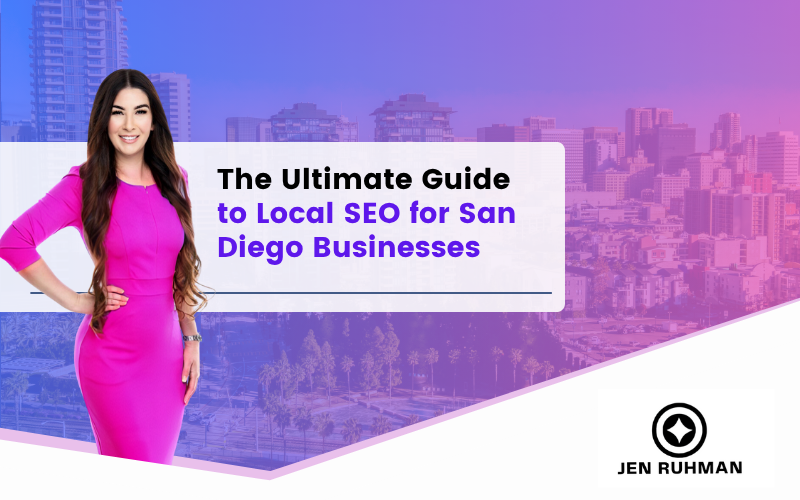
May 16, 2025 | SEO Tips
The Ultimate Guide to Local SEO for San Diego Businesses
Hi, I’m Jen Ruhman, your go-to local San Diego SEO company. If you run a business in this beautiful city, you know how important it is to stand out online. With so much competition, local SEO (Search Engine Optimization) is crucial to reaching your customers effectively. Today, I’ll share my best local SEO tips and strategies to help your San Diego business shine online. Let’s dive in!

What Exactly is Local SEO?
Local SEO helps your business appear in search results when someone searches locally—like “coffee shop near me” or “best plumber in San Diego.” It ensures that customers find you first, not your competitors.
When I first started my SEO business, I focused heavily on local SEO, and it made a huge difference. Clients started finding me easily, and the phone wouldn’t stop ringing!
Why is Local SEO Crucial for San Diego Businesses?
San Diego is a competitive city. Businesses pop up every day. Local SEO helps your business:
- Stand out in local searches
- Connect with nearby customers
- Boost traffic to your physical store
I’ve helped dozens of San Diego businesses—from restaurants to law firms—dramatically increase their customer base using local SEO.
Key Steps for Mastering Local SEO
Let’s break down the essential steps:
Optimize Your Google Business Profile
This is step number one. Google Business Profile (GBP) is your business’s listing on Google. It helps people quickly find important information like your hours, location, and reviews.
- Claim your Google Business Profile if you haven’t.
- Verify your business address.
- Fill out every detail: hours, website, phone number, and business description.
- Regularly post updates and photos.
When I fully optimized my client’s GBP profile, their visibility skyrocketed overnight!
Use the Right Keywords
Finding the best keywords is crucial. Think about what customers type into Google to find you. For example, instead of just “pizza,” use “best pizza in San Diego.”
Tools like Google Keyword Planner help you find keywords easily.
Create Location-Specific Webpages
If you have multiple locations around San Diego—like one in La Jolla and one downtown—make a separate webpage for each. Each page should clearly list the address, local contact info, and specific neighborhood keywords.
I did this for a client with three locations, and each location started showing up independently in local searches, bringing in more targeted traffic.
Build Local Citations
A citation is any mention of your business online that includes your name, address, and phone number (NAP). Consistency matters—your NAP must be exactly the same everywhere online.
Key citation sources include:
- Yelp
- Yellow Pages
- Local directories like San Diego Chamber of Commerce
One of my clients found great success by fixing citation errors that caused confusion with Google. Their local rankings quickly improved.
Get Quality Reviews
Reviews are powerful. Positive reviews help build trust with potential customers and significantly improve your local SEO ranking.
- Politely ask happy customers for reviews.
- Respond quickly and professionally to reviews.
- Address negative reviews calmly and respectfully.
One client of mine implemented a simple system for requesting reviews after each sale, and within a month, their positive reviews doubled, significantly boosting their local visibility.
Improve Your Website’s Local SEO Performance
A great website is key. Here’s how to optimize yours:
Mobile-Friendly Design
Over 50% of local searches happen on mobile devices. Make sure your website is easy to use on phones. Google prioritizes mobile-friendly websites.
Fast Loading Speeds
Slow websites frustrate users and harm your SEO. Compress images, streamline code, and use caching to improve speed.
Localized Content
Write blogs and articles focused on local issues, events, or news. For example, “Top 5 Things to Do in San Diego This Summer.” This connects with local audiences and boosts your ranking for San Diego-based searches.
Harness the Power of Social Media
While not a direct ranking factor, social media enhances local SEO indirectly:
- Share your website content regularly on social media.
- Engage with followers, answering questions, and responding to comments.
- Use location tags and hashtags specific to San Diego.
One of my clients regularly posted engaging local content on Instagram and Facebook, leading to increased local traffic and stronger brand awareness.
Track Your Results
SEO isn’t guesswork—it’s data-driven. Regularly track your results using tools like Google Analytics and Google Search Console:
- Monitor traffic increases
- Track keyword rankings
- Evaluate user engagement
I check these tools every week for my clients. It helps me quickly adjust my strategy and keep growth steady.
Common Local SEO Mistakes to Avoid
Here are common pitfalls you should steer clear of:
- Inconsistent NAP information
- Ignoring customer reviews
- Not optimizing your Google Business Profile
- Forgetting to target local keywords
When I fixed these mistakes for a San Diego bakery client, they saw a noticeable increase in foot traffic and online orders.
Let Me Help You Boost Your Local SEO
I love helping San Diego businesses succeed online. If all of this sounds like a lot to handle, that’s where I come in.
Feel free to contact me to see how I can help your business grow online:
Call/Text me: (619) 719-1315
Together, we can take your San Diego business to the top of local search results!
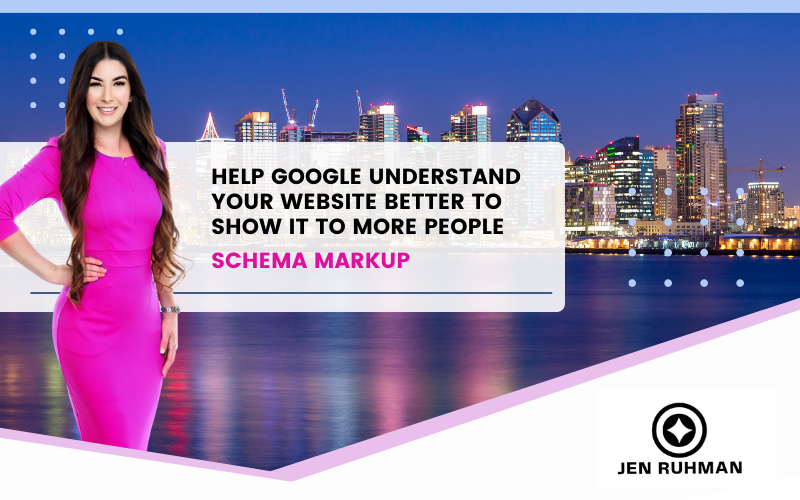
Apr 27, 2025 | SEO Tips

Hi, I’m Jen Ruhman, the founder of Jen Ruhman SEO, a San Diego SEO company. Over the years, I’ve seen firsthand how powerful schema markup can be when it comes to climbing the Google rankings. Today, I’m going to break it down in a simple, friendly way, just like I would if we were chatting over coffee.
What is Schema Markup, Anyway?
Schema markup is basically like adding “cliff notes” to your website for search engines. It helps Google better understand what your page is about so it can show your content more accurately—and more attractively—on search results.
When I first added schema to my own website, I immediately noticed an increase in click-through rates. Why? Because rich snippets like star ratings, FAQs, and event dates make listings stand out.
Why Schema Markup Matters for SEO
- Improves Visibility in SERPs
- Boosts Click-Through Rates
- Provides More Information to Users
- Supports Voice Search
Google loves websites that make life easier for users. Schema markup does exactly that—and it gives you a competitive edge.
Top Schema Markup Strategies I Use for My Clients
1. Start with the Basics: Organization Schema
If you’re a business owner like me, the first schema you should install is Organization Schema.
It tells Google the basics about your company—name, logo, address, phone number, etc.
Personal Tip: I once had a client who didn’t have Organization Schema set up. After we added it, their local SEO rankings jumped within a month!
2. Add Local Business Schema (Especially if You’re Local!)
Running a local business? Local Business Schema is your best friend.
It lets you specify your service area, opening hours, and even accepted payment methods.
When I added this to a client’s plumbing website, we saw them move from page two to page one for “plumbers near me.”
3. Use FAQ Schema for Quick Wins
FAQ Schema is gold for getting more real estate on Google.
You can mark up common questions and answers directly on your service pages.
I use FAQ Schema on almost every service page I create—it’s simple, it’s fast, and it really makes listings pop.
4. Product Schema for E-Commerce Sites
Selling products online? You absolutely need Product Schema.
It lets you display:
- Price
- Availability
- Star Ratings
- Review Counts
I helped a boutique client implement Product Schema, and within a few weeks, their product listings started showing star ratings on Google, leading to a noticeable boost in traffic.
5. Article Schema for Blog Posts
If you’re writing blog posts (like I’m doing now!), Article Schema helps Google treat your content like a professional publication.
For my blog, I always add Article Schema because it signals expertise and quality to search engines.
6. Review Schema: Build Trust Fast
When I launched review schema on my testimonials page, I noticed an immediate uptick in new inquiries. People trust reviews!
If you have genuine reviews, using Review Schema on your service or product pages can dramatically increase trust and clicks.
Advanced Schema Markup Strategies to Stand Out
7. Add How-To Schema for Tutorials
Do you create tutorials? (I love writing SEO how-to guides!)
Adding How-To Schema can help your step-by-step guides show up as featured snippets.
8. Video Schema for Video Content
Got videos? Video Schema helps your videos show thumbnail previews right in search results.
I use it whenever I upload a video tutorial or explainer to make my listings more eye-catching.
9. Event Schema for Promotions and Workshops
If you host workshops, webinars, or special events, Event Schema can help you show event details right on Google.
Back when I hosted my first SEO workshop in San Diego, adding Event Schema made a noticeable difference in how many RSVPs we received.
10. Recipe Schema (for Food Blogs)
Okay, I’m not a food blogger, but I have friends who are—and they swear by Recipe Schema.
It helps show cooking times, ingredients, and even calories right in the SERPs.
Best Practices for Using Schema
Keep it Honest and Accurate
Don’t try to fake reviews or events with schema—Google’s smarter than that and penalties can be brutal.
Use Google’s Rich Results Test
After you install schema, always double-check your work with Google’s Rich Results Test.
Keep Your Schema Updated
If your address, event dates, or business hours change, update your schema ASAP. Outdated info = lost trust.
How I Add Schema Markup
There are a few ways you can add schema to your site:
- Use a plugin like Rank Math or Yoast SEO (super easy for WordPress sites)
- Hardcode it manually into your HTML (what I usually do for custom builds)
- Use Google’s Structured Data Markup Helper (great for beginners)
Personally, I love doing it manually for clients because it’s cleaner and faster—and I can control every little detail.
Schema Isn’t Optional Anymore
If you’re serious about SEO, schema markup isn’t a “maybe”—it’s a must.
I’ve seen firsthand how a few tweaks with schema can boost rankings, increase traffic, and help businesses (including mine!) get more customers.
It’s like adding rocket fuel to your SEO efforts.
If you’re feeling overwhelmed, don’t worry—start small. Add Organization Schema, sprinkle in some FAQs, and build from there. Before you know it, you’ll be dominating Google’s search results.
FAQs
1. How long does it take for schema changes to impact SEO?
Usually, you’ll see changes within a few weeks, but it can vary depending on how often Google crawls your site.
2. Do I need coding skills to add schema?
Nope! Plugins like Rank Math and Yoast make it super easy without touching a line of code.
3. Can schema markup hurt my SEO if done incorrectly?
If you use schema incorrectly or deceptively, it can lead to penalties. Always stick to honest, accurate info.
4. How much schema should I add to a page?
Add only what’s relevant. Overloading a page with unnecessary schema can confuse search engines.
5. Is schema markup important for small businesses?
Absolutely! Small businesses can especially benefit because schema helps them compete with bigger brands on the same search results page.
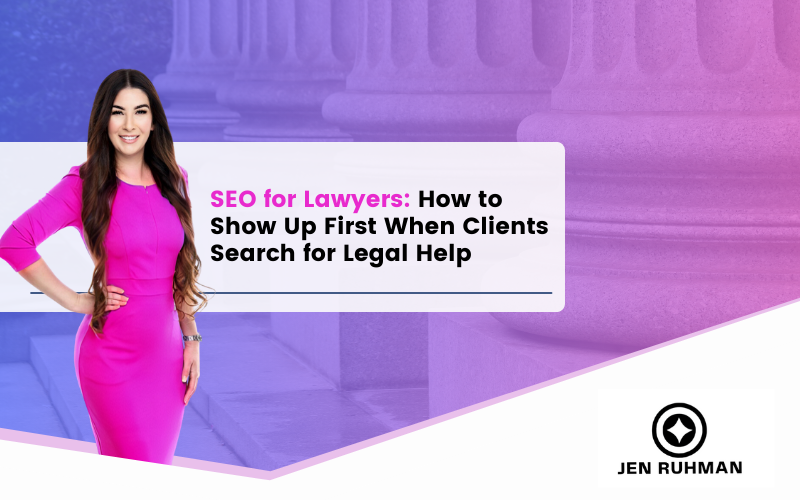
Mar 21, 2025 | SEO Tips

As the owner of an SEO company here in San Diego, I’ve worked with all kinds of local businesses—but one thing I’ve noticed over the years is how competitive the legal field is, especially when it comes to Google search. If you’re a lawyer, you already know how hard it is to stand out. The good news? With the right SEO strategy, you can show up at the top of local search results when potential clients are looking for legal help.
In this post, I’ll walk you through exactly how to make that happen, in plain English—no jargon, no fluff. Whether you’re a criminal defense attorney, personal injury lawyer, or family law specialist, these tips can help you rise to the top of Google where your clients are searching.
Here’s some great success I’ve had ranking my client for variations of keywords:
Note that each of these keywords receives an estimated 4,400 searches per month, known as “keyword volume”. The graph below reflects a total of 39,600 monthly estimates in keyword volume.
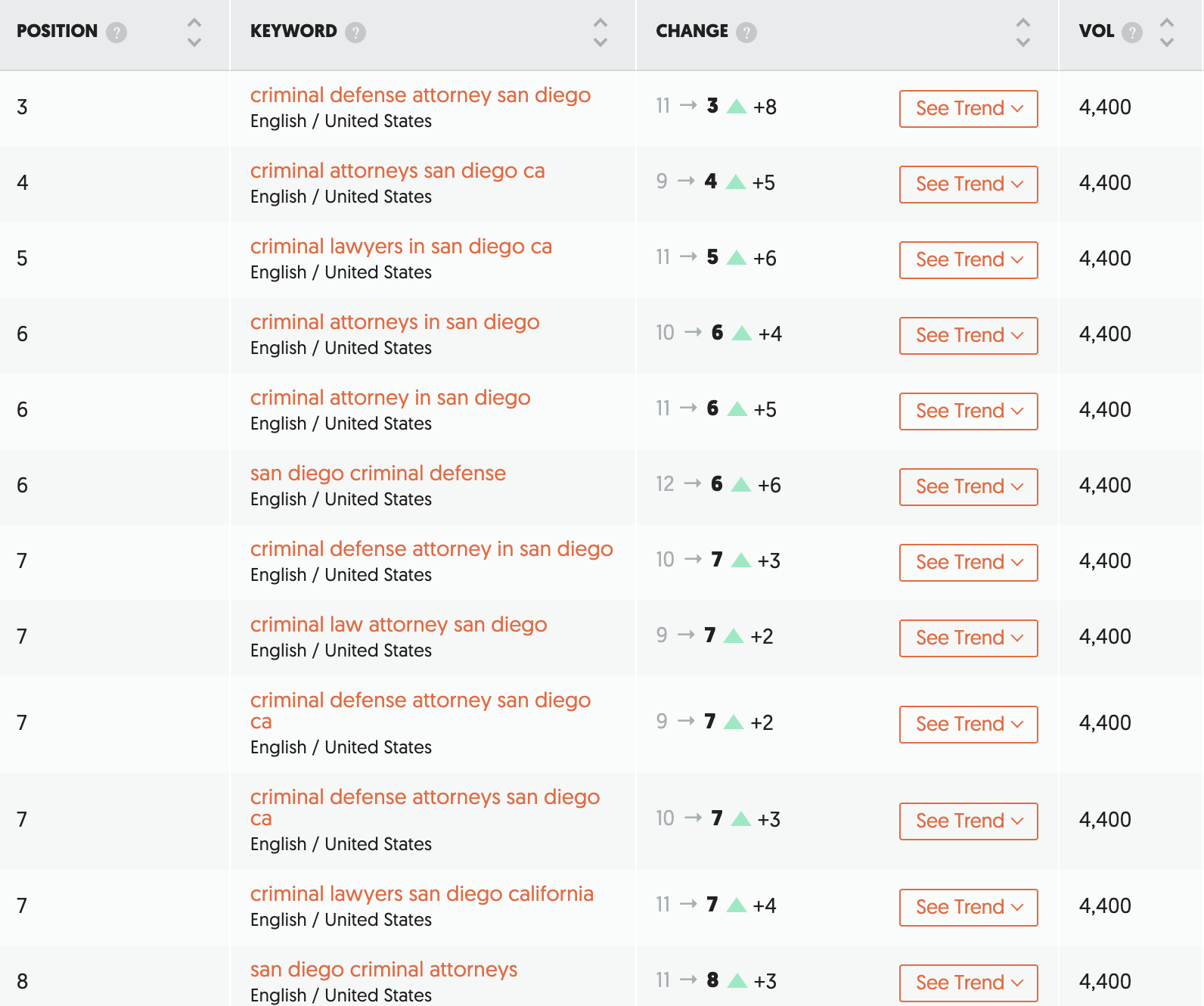
Why SEO Matters So Much for Lawyers
When someone needs a lawyer, what do they do first?
They open Google and search:
- “divorce lawyer near me”
- “San Diego DUI attorney”
- “personal injury lawyer free consultation”
If your firm isn’t showing up on the first page—especially in the Google Local Pack (that 3-map listing at the top)—you’re missing out on serious leads. People trust those top results. And let’s be real: no one is scrolling to page 3 to find legal help.
In the legal arena, clicks cost fortunes: where a single client’s value can soar into millions, keywords like ‘Truck Accident Lawyer’ command up to $700, a testament to the high-stakes game of justice.
Examples of Expensive Law Keywords (CPC Estimates)
- Criminal Defense Lawyer San Diego – $100–$250 per click
- DUI Lawyer San Diego – $75–$200 per click
- Personal Injury Lawyer San Diego – $150–$500 per click
- Car Accident Lawyer San Diego – $200–$600 per click
- Truck Accident Lawyer San Diego – $250–$700 per click
- Medical Malpractice Attorney San Diego – $150–$400 per click
- Wrongful Death Lawyer San Diego – $200–$500 per click
- Divorce Attorney San Diego – $50–$200 per click
- Family Law Attorney San Diego – $75–$250 per click
- Employment Lawyer San Diego – $50–$150 per click
These are estimates, as Google Ads pricing fluctuates based on competition, bidding strategies, and Quality Score. However, legal keywords consistently rank among the most expensive due to the high client lifetime value (e.g., a single personal injury case can be worth millions).
What Is Local SEO for Lawyers?
Local SEO helps your law firm appear in local Google search results—especially when someone searches for legal services in your city. It’s not just about having a website; it’s about making sure your site and online presence are optimized for location-based searches.
Here’s what that includes:
- Your Google Business Profile (formerly Google My Business)
- Local keywords on your website
- Online reviews
- Legal directory listings (like Avvo or Justia)
- Mobile-friendly website
- Fast load times and clear contact info
Think of it this way: SEO makes it easy for Google to know what you do and where you do it—so it can send the right people your way.
Step-by-Step: How to Rank First on Google as a Lawyer
Step 1: Optimize Your Google Business Profile
This is a biggie. I’ve helped many lawyers boost their visibility by simply improving their Google Business Profile. Make sure yours is:
- Completely filled out
- Has accurate contact info, hours, and address
- Includes your top legal services in the business description
- Uses photos (your office, team, etc.)
- Gets frequent 5-star reviews (more on this in a minute)
Tip from me: One of my law clients had their address listed wrong by one number. We fixed it and within two weeks, they jumped up to the top 3 in Google Maps.
Step 2: Use the Right Local Keywords on Your Website
You need to use the same words your potential clients are typing into Google. This includes terms like:
- “San Diego personal injury lawyer”
- “Criminal defense attorney near me”
- “Best DUI lawyer in [your city]”
Sprinkle these naturally in your:
- Page titles (H1 and H2 headers)
- Service pages
- Meta descriptions
- Blog posts
Don’t overstuff keywords. Google’s smart enough to know when you’re trying to game the system.
Step 3: Create Service Pages for Each Area of Law
If you’re a jack-of-all-trades attorney with one page that lists everything you do—divorce, custody, immigration, personal injury—you’re doing yourself a disservice.
Instead, create dedicated pages for each service:
- Divorce Lawyer in San Diego
- Child Custody Attorney
- Immigration Legal Help in San Diego
Each page should include:
- A clear description of your service
- Location-based keywords
- Client FAQs
- A call-to-action like “Call now for a free consultation”
When I did this for a local family law firm, they saw traffic double in under three months. Why? Google had clear, specific content to match to user searches.
Step 4: Collect and Respond to Online Reviews
Online reviews are a major ranking factor for local SEO. They also build trust with potential clients who might be comparing you to a few other firms.
Encourage happy clients to leave you a review on Google (and maybe Avvo or Yelp).
Make it easy: send them a direct link to your Google review page.
Respond to every review—even the not-so-great ones. Show potential clients you care and are active online.
Step 5: Get Listed in Legal and Local Directories
Your business info should appear consistently across all major directories:
- Avvo
- Justia
- Yelp
- FindLaw
- Super Lawyers
- Better Business Bureau
- Local chambers of commerce or bar associations
Make sure your name, address, and phone number (NAP) are the same across all platforms. Inconsistencies confuse Google.
Step 6: Write Helpful, Local-Focused Blog Content
This is where you really get to show your expertise and build trust. Regular blogging can boost SEO and help potential clients find answers to their legal questions.
Some blog ideas:
- “What to Do After a DUI Arrest in San Diego”
- “How Long Does a Divorce Take in California?”
- “Do I Need a Lawyer for a First-Time Drug Charge?”
I had one lawyer blog about “How to Expunge a Record in San Diego” and it brought in hundreds of monthly visits—and several new clients.
Step 7: Make Sure Your Website Loads Fast and Looks Good on Mobile
Google cares about user experience. If your site is slow or hard to use on a phone, you won’t rank well.
Do a quick test:
- Visit your site on your phone
- How fast does it load?
- Can you easily find your phone number?
- Is there a button to call you directly?
If not, you’re likely losing leads before they even call.
Bonus: Track Your Progress with Simple Tools
You don’t need to be a tech expert to see if your SEO is working. Here are a few tools I use with my clients:
- Google Search Console – Shows what keywords are bringing people to your site
- Google Analytics – Tracks how many visitors you get
- Google Business Insights – See how many people view or call from your profile
These tools help us adjust and improve your SEO over time.
Final Thoughts: You Don’t Have to Do This Alone
I know SEO can feel overwhelming, especially when you’re already busy running a law practice. But the truth is, SEO is no longer optional—it’s essential if you want to compete and grow in today’s digital world.
That’s where I come in.
At my SEO company here in San Diego, I work with lawyers just like you to create custom strategies that get real results—more calls, more consultations, and more paying clients.
Want to chat about how we can improve your law firm’s SEO?
Feel free to reach out to me here, and let’s get your firm showing up first when it matters most.
Need help with your law firm website? Give me a call / text at: (619) 719-1315
Thanks for reading,
Jen Ruhman
SEO Expert & Founder of JenRuhman.com









